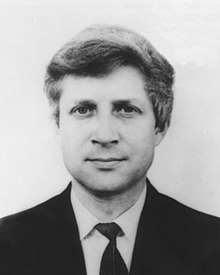Nikolai Kardashev
Nikolai Semenovich Kardashev[1] (Russian: Никола́й Семёнович Кардашёв, IPA: [nʲɪkɐˈlaj sʲɪˈmʲɵnəvʲɪtɕ kərdɐˈʂof]; 25 April 1932 – 3 August 2019[2]) was a Soviet and Russian astrophysicist, Doctor of Physical and Mathematical Sciences, and the deputy director of the Astro Space Center of PN Lebedev Physical Institute of the Russian Academy of Sciences in Moscow.
Nikolai Kardashev | |
|---|---|
 | |
| Born | Nikolai Semenovich Kardashev April 25, 1932 Moscow, Russian SFSR, Soviet Union |
| Died | August 3, 2019 (aged 87) |
| Nationality | Soviet Union (Russia from 25 December 1991) |
| Occupation | Astrophysicist |
| Known for | Kardashev scale |
Early Life
Born in Moscow to a family of professional revolutionaries involved with the Bolshevik Party.[3]
- His father was a prominent member of the party and his mother later joined as well before the 1917 October Revolution.[3]
- In 1937 and 1938 (during Stalin’s repressions), both of his parents were arrested. His father was ultimately shot and his mother was forced into labor camps and would not be released for many years.[3]
- Due to his parents’ absence, he was sent to an orphanage where he then was taken by his mother’s sister after a great deal of effort.[4]
- His aunt then died during WWII when he was 16 years old and he then had to live on his own[4] in a large communal flat.
- His mother was released in 1956, at which point Nikolai had completed university.[3]
- His interest in astronomy began while in 5th grade where he would attend a hobby group at the Moscow Planetarium.[3]
Education
- Moscow State. University (MGU in Russ. abbr.) - Astronomy division of the Mechanics and Mathematics Department[3]
- Here he focused his studies/interests in radio astronomy. A field which was new and constantly developing.[3]
Career
- Joined the Space Research Institute (IKI) of the USSR Academy of Sciences in 1967. [5]
- Became deputy director of IKI in 1977.[5]
- During the dissolution of the USSR, Nikolai became the director of the Astro Space Center of the Lebedev Physical Institute.[5]
- In 1978, Nikolai started a project called the Space VLBI mission RadioAstron. This mission covered more than 30 years and was finally launched in 2011.[5]
- The RadioAstron mission has become one of the highlights of modern observational astrophysics.[5]
Organizations & His Role in Them[6][7][8]
- International Astronomical Union:[6]
- Vice-President of Executive Committee (1997-2003)[6]
- Vice-President of Commission 51 Bio-Astronomy (1982-1991)[6]
- Organizing Committee Member of Commission 40 Radio Astronomy (1967-1985)[6]
- Member of Division B Facilities, Technologies and Data Science (2019)[6]
- Member of Division F Planetary Systems and Astrobiology (2019)[6]
- Member of Commission 40 Radio Astronomy (2015)[6]
- Member of Commission 51 Bio-Astronomy (2015)[6]
- Member of Division III Planetary Systems Sciences (2012)[6]
- Member of Division X Radio Astronomy (2012)[6]
- Member of Special Nominating Committee (2000-2003)[6]
- USSR Academy of Sciences, Division of General Physics and Astronomy:[7]
- Committee on Space Research[8]
- Vice President of the Committee for Space Research from 1982-1986.[8]
Scientific Career
- Discoveries
- Awards and Honors
- Published Works
- 1963 - "Candidate of Science" dissertation, later promoted to higher level of doctoral thesis.[8]
- 1964 - “Transmission of Information by Extraterrestrial Civilizations”[8]
- Presented the classification of civilizations based on their level of power consumption spanning 20 orders of magnitude. Became known as Kardashev Scale.[8]
Film Career[9]
- His first connection with the film industry was in 1981. He was asked to be a consultant on the set of Petyla Oriona a Russian tv series documentary.[9]
- Played himself in a tv show episode on the documentary series "Spaces Deepest Secrets" in 2018.[9]
- Played himself in a tv show episode on the documentary series "Horizon" in 2018.[9]
Extraterrestrial Research
- May have predicted the existence of pulsars before they were officially discovered.[3]
- ‘Transmission of Information by Extraterrestrial Civilizations'[3]
Death
- Passed away on August 3rd 2019 at the age of 87.[4]
See also
- Kardashev scale
- Astroengineering
- Drake equation
- SETI
- Planetary civilization
- Orders of magnitude (power)
- Orders of magnitude (energy)
- Technological singularity
- World energy resources and consumption
Publications
- Kardashev, Nikolai (1985). "On the Inevitability and the Possible Structures of Supercivilizations" in "The search for extraterrestrial life: Recent developments; Proceedings of the Symposium, Boston, MA, June 18–21, 1984". pp. 497–504. Bibcode:1985IAUS..112..497K.
References
- Also transliterated Kardashov, preserving the letter yo.
- "Умер выдающийся советский астрофизик Николай Кардашев" (in Russian). Красная Весна. 2019-08-04.
- "ShieldSquare Captcha". doi:10.3367/UFNe.0182.201206i.0677. Cite journal requires
|journal=(help) - "Astrophysics Legend Nikolai Kardashev, Civilization Ranking Scale Author, Died Age 87". asgardia.space. Retrieved 2020-04-28.
- I. Gurvits Leonid Joint Institute for VLBI ERIC, Dwingeloo; Y. Kovalev Yuri Astro Space Center of Lebedev Physical Institute, Moscow; G. Edwards Philip CSIRO Astronomy and Space Science, Marsfield (2019-12-16). "Nikolai Kardashev". Physics Today. 2019 (4o): 1216a. Bibcode:2019PhT..2019R...4.. doi:10.1063/PT.6.4o.20191216a.
- "International Astronomical Union | IAU". www.iau.org. Retrieved 2020-04-28.
- "Nikolai Kardashev, 1932-2019 | METI International". meti.org. Retrieved 2020-04-28.
- I. Gurvits Leonid Joint Institute for VLBI ERIC, Dwingeloo; Y. Kovalev Yuri Astro Space Center of Lebedev Physical Institute, Moscow; G. Edwards Philip CSIRO Astronomy and Space Science, Marsfield (2019-12-16). "Nikolai Kardashev". Physics Today. 2019 (4o): 1216a. Bibcode:2019PhT..2019R...4.. doi:10.1063/PT.6.4o.20191216a.
- "Nikolai Kardashev". IMDb. Retrieved 2020-04-28.
This article is issued from Wikipedia. The text is licensed under Creative Commons - Attribution - Sharealike. Additional terms may apply for the media files.